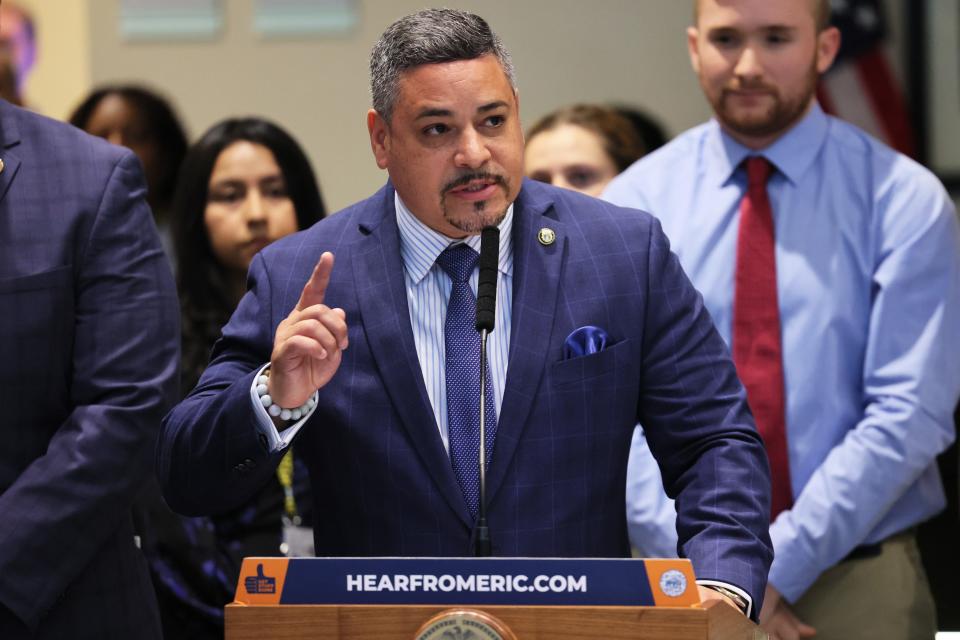Police misconduct settlements can cost millions, but departments rarely feel the impact
Last week, the Los Angeles County Board of Supervisors approved a $700,000 settlement for a radio reporter who was slammed to the ground and taken into custody during a demonstration in September 2020.
That announcement came days after the city council in Fort Worth, Texas, proposed a $3.5 million settlement for the nephew of Atatiana Jefferson, who was fatally shot by a police officer in 2019. Jefferson was playing video games with her nephew when she was killed.
These payouts are just a fraction of the reported billions of dollars paid by local governments around the country to resolve lawsuits related to allegations of police misconduct.

Criticism of the amount of money spent on such settlements became part of the larger national conversation about police spending amid the worldwide protests following the 2020 murder of George Floyd in Minneapolis. But research has shown lawsuit payouts account for less than 1% of local government budgets, police departments themselves rarely feel the financial impact and individual officers are almost never required to contribute, meaning there may be little financial incentive to prevent future misconduct.
"There doesn't seem to be a real connection between what's happening in the courtroom and what's happening on the ground in terms of policing and policing trends, which is a real problem and shouldn't be the case," said Alexa Van Brunt, an attorney and director of the MacArthur Justice Center Clinic at Northwestern Pritzker School of Law.
What are police misconduct settlements?
Settlements can be used to resolve state or federal lawsuits or allegations of wrongdoing by police officers and their departments brought by victims or their surviving family members. The claims may include violations of constitutional rights or state law, including excessive use of force, assault, battery, wrongful arrest or wrongful death.
Van Brunt said the amount of money is determined by the quality of evidence and previous settlements or jury verdicts in similar cases. She said it can take years for a police misconduct case to be settled.
"It's just adding trauma to an already incredibly traumatic scenario to force people to go through years of litigation - really aggressive and hostile questioning - just to get to a point of settlement where it should have gotten in the first place," she said.
Do police departments pay for misconduct settlements?
There are multiple ways local governments pay for police misconduct settlements, according to research done by Joanna Schwartz, professor at University of California Los Angeles School of Law. Smaller jurisdictions often rely on liability insurance, but larger departments are typically "self insured," meaning settlements and judgements are paid from the department's budgets or through the local government's central litigation fund.
Regardless of the financial arrangement, Schwartz said "there is rarely any tangible impact on the police department of those payments."
"Clearly if the money is just paid directly from the central fund, there's no impact," she said. "If an agency is given money during the budgeting process and then that money essentially goes to litigation funds, it's also having no impact, meaning that there's not surplus funds for them if their lawsuit payments go down or the need to cut back on other expenses if the costs go up."

Do police officers pay for misconduct settlements?
Schwartz found officers themselves virtually never have to contribute to settlements. That could change in places like Colorado, she said. A 2020 law eliminated qualified immunity for police officers and granted local governments the ability to make officers pay 5% or up to $25,000 of a settlement or judgment from a lawsuit in certain circumstances.
In the three years since the bill became law, no local governments appear to have done so, the Denver Post reported in June.
How much is spent on police misconduct settlements?
A 2022 Washington Post investigation found 25 of the nation’s largest police and sheriff’s departments spent more than $3.2 billion to settle alleged misconduct claims within the past decade, including $1.5 billion in cases involving officers who were accused of misconduct more than once.
New York City, for example, spent more than $50 million between January and July to settle lawsuits alleging misconduct by members of the nation's largest police department, according to an analysis of data released by the Legal Aid Society in September. Jennvine Wong, staff attorney with the Cop Accountability Project at The Legal Aid Society, said payments have generally increased, but the data is not perfect: Settlements that resolve cases before formal litigation aren't included.

How much money do victims of police brutality get?
The median amount of payments analyzed by the Post was $17,500, and the outlet reported most cases were resolved without much publicity. But in high-profile cases like Jefferson's, the payouts can cost millions of dollars.
After worldwide protests broke out over Floyd's murder in police custody, Minneapolis city leaders approved a $27 million payment for Floyd's family to settle a wrongful death lawsuit in 2021. In February, a $45 million settlement in the case involving Richard "Randy" Cox, a Black man paralyzed from the chest down after an arrest in Connecticut, became the largest settlement involving police misconduct in U.S. history.
$45M in Randy Cox case: Largest settlement in US history over police misconduct reached
Do settlements stop police misconduct?
Schwartz said some victims may ask for policy changes as part of their settlement agreements and some insurers have threatened to raise premiums or withdraw coverage if agencies don't change policies or fire certain employees, but said it is unclear how often this happens.
The New York City Police Department carefully analyzes allegations in civil lawsuits and trends in litigation against the NYPD, the department said in a statement to USA TODAY. The department said a substantial portion of the payouts in 2023 stem from decades old wrongful convictions, which "do not speak to the NYPD’s policies and practices today."
But Wong said the settlements are still "indicative of really problematic policing patterns that they just have not addressed." She added that the vast majority of lawsuits are settled without an admission of wrongdoing and questioned whether officers that are repeatedly named in these cases are being sufficiently disciplined.
"It just becomes a cost of doing business, but there's nothing else being done," she said. "And certainly there's no incentive for the officers or for NYPD to take this misconduct seriously."
What more can be done to curb police misconduct?
Schwartz said while shifting the financial burden of misconduct to law enforcement agencies makes sense, doing so is not a "silver bullet" that would resolve issues with policing. But, she said it could encourage agencies "to engage in basic risk management."
She said local governments could bring in outside auditors to identify trends in these lawsuits, like repeat offenders, and address them.
"That's sort of one thought about how city councils could as a condition of the budget or simply as an exercise of their authority take more initiative to learn from these cases instead of simply treating them as the cost of doing business," she said.
Contributing: TaMaryn Waters, Tallahassee Democrat and Claire Thornton, USA TODAY; The Associated Press
This article originally appeared on USA TODAY: Misconduct settlements can cost millions but police rarely feel impact

